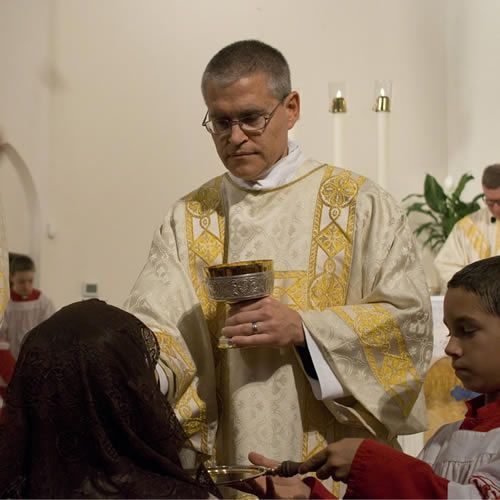Mass and Confession Schedule
Mass Schedule
Saturday Vigil - 5:30 pm
Sunday - 7:30 am, 9:00 am, 11:00 am, 12:30 pm
Monday-Friday - 12:10 pm
Saturday morning - 8:00 am
Confessions
Saturday 4:00 - 5:00 pm
Sunday - 10:00 - 11:00 am
Weekdays 30 minutes prior to Mass
Other times by appointment. Contact the parish office at
(704) 334-2283
Reception of Holy Communion
Communion is an intimate encounter with Christ, in which we sacramentally receive Christ into our bodies, that we may be more completely assimilated into His. Because of the gravity of Jesus’ teaching on receiving the Eucharist, the Church encourages Catholics to receive frequent Communion, even daily Communion if possible, and mandates reception of the Eucharist at least once a year during the Easter season.
To prepare oneself to receive Holy Communion, one must be a baptized Catholic who has made First Holy Communion and who is living in a state of grace. If one is aware of having committed a mortal sin, he or she must first seek Sacramental forgiveness and absolution in Confession before receiving Communion. Anyone who receives Communion while aware of a serious sin (i.e. missing Mass on Sunday without serious cause) commits the sin of sacrilege. Practicing Catholics must also abide by the Eucharistic Fast. The fast means that those who plan to receive Holy Communion must refrain from food or drink (with the exception of water) for one hour before receiving Communion. Only those Catholics whose health requires frequent food or drink, or who have other serious health reasons, are exempt from this requirement. Fasting even for a brief time not only makes us hunger for food and drink, it helps us purify ourselves, turning our minds and hearts to God. Additionally, Catholics who are married outside the Catholic Church are not permitted to receive Holy Communion. Non-Catholics are certainly invited to participate in the celebration of the Mass but are asked to refrain from reception of Holy Communion since Communion presupposes union with the Church.
Receiving the Body & Blood of Christ
Catholics who are prepared to receive Communion and are in the state of grace normally receive Communion on the tongue (in the United States a communicant may also receive on the hand). The way we receive Holy Communion tells much about what we believe we are doing.

It is the communicant’s preference whether to receive on the tongue or in the hand. When we receive Holy Communion in the hand, the Fathers of the Church say we should present our hands like a throne to receive a king. Generally, we place one hand underneath the other to receive the Eucharist and we use the bottom hand to pick it up from our top hand and place it in our mouth. When receiving in the hand, be sure to take one small step to the side and place the host on your tongue so that the minister of Holy Communion can see you consume the host. Additionaly, all are asked to bow the head before the Sacrament as a gesture of reverence prior to receiving the Body and the Blood of the Lord.
Of importance to note is that when one receives only the consecrated host, one truly receives the glorified Body and Blood, Soul and Divinity of our Savior, Jesus Christ. The practice of distributing the Precious Blood is not in any way necessary for salvation - it is a fuller sign of Holy Communion, but not a fuller reality of Christ Himself than what is received under the form of bread alone. The U.S. bishops recognize that Communion under both species is not always possible or desirable. Communion under both species is only allowed when “the faithful have been well instructed and there is no danger of the profanation of the Sacrament or that the rite would be difficult to carry out on account of the number of participants or for some other reason” (GIRM, no. 283, as cited in Norms, no. 24). In addition, the norms point out that the bishop or pastor may limit the distribution of Communion under both species in order to “avoid obscuring the role of the priest and the deacon as the ordinary ministers of Holy Communion” (Norms, no. 24).
For Fellow Christians
Because Catholics believe that the celebration of the Eucharist is a sign of the reality of the oneness of faith, life and worship, members of those churches with whom we are not yet fully united are ordinarily not admitted to Holy Communion. Eucharistic sharing in exceptional circumstances by other Christians requires permission according to the directives of the diocesan bishop and the provisions of Canon Law (CIC 844.4). All who are not receiving Holy Communion are encouraged to express in their hearts a prayerful desire for unity with the Lord Jesus and with one another. We pray that our common baptism and the action of the Holy Spirit in this Eucharist will draw us closer to one another and begin to dispel the sad divisions which separate us.




